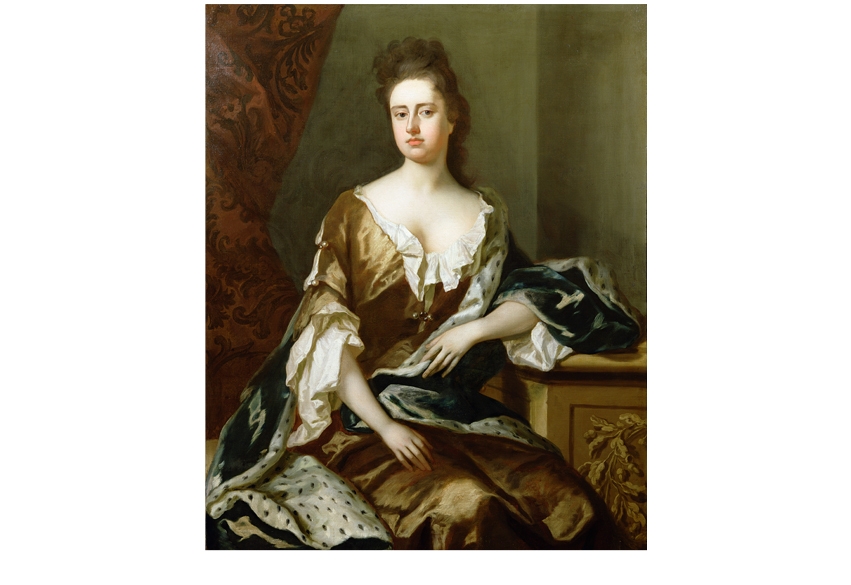She was the ill-educated younger child of the Duke of York; a mere female, she was sickly and not expected to survive, let alone become Queen. But, as this monumental and long overdue reappraisal shows, it was a mistake to underestimate Anne Stuart. She had always been ambitious and had great tenacity. She had no qualms about putting her beloved Church of England above loyalty to her father and King, the Catholic James II. Indeed, she was a key player in the Revolution of 1688. Legislation declaring that the monarch could not be Catholic or married to a Catholic meant that the question of her Catholic half brother’s legitimacy and his right to the throne was never an issue for Anne. Far from feeling remorse at denying her brother his birthright, this latest biography argues that Anne did not trouble her conscience with something that could not be undone.
One of Anne’s less attractive features was her readiness to take umbrage at some perceived slight. She bore a grudge against her stepmother, Queen Mary Beatrice, not hesitating to sully her reputation to suit her own interests, and quarrelled first with her sister Mary II and brother-in-law William III, ‘the Dutch abortive’ as she called him, then with her erstwhile favourite, Sarah Churchill. Anne was happy to play the victim, even if she was never a victim. Nor was she as weak as she liked to portray herself.
Her passion for the dazzling Sarah begs the question, did she have lesbian tendencies? Anne Somerset maintains that intense, platonic female friendships were quite the norm in the 17th century, but that lesbianism was regarded as some rare, esoteric perversion. Certainly Anne, a devout Christian, was devastated when Sarah, incensed at being supplanted in the Queen’s affections by the bedchamber woman Abigail Hill, drew her attention to a lampoon — composed by Sarah’s secretary — suggesting she indulged in ‘some dark deeds at night’ with Hill.
Anne’s devotion to her husband, the vacuous Prince George of Denmark, was touching, and she wins sympathy for enduring 17 pregnancies, mostly ending in failure. This is now attributed to Hughes syndrome, or ‘sticky blood’. Tragically, she lost two girls in infancy and her last surviving child, William, Duke of Gloucester, who suffered from hydrocephalus, died aged 11.
By the time she became Queen, Anne was almost an invalid. Somerset’s explanation that she was suffering from the auto-immune disease lupus is convincing. It makes Anne’s dedication to her duties all the more admirable.
No monarch has ever endured such taunts and torments from a subject as Anne did from Sarah, Duchess of Marlborough. The wonder is that she did not lose patience and dismiss Sarah long before she did, but of course she could not afford to alienate the Duke, the great military commander who was winning such victories for her in the ruinously expensive war with France.
For such a vibrant personality as Sarah, Anne was dull company. But Sarah made the cardinal mistake of thinking Anne stupid, which she was not, and of frequently telling her so. A passionate Whig, Sarah never ceased haranguing the Queen for her Tory sympathies. She could not believe Anne capable of making her own decisions. So furious and frustrated was she that she could no longer influence the Queen — had she ever, truly? — that she resorted to blackmail, threatening to publish the letters in which Anne’s immoderate passion for her would be exposed to the ridicule of the world. It would have been interesting to read some of these letters, if they survive.
The Duke of Marlborough’s correspondence with the exiled Stuart court is well known, but Somerset’s contention that after his dismissal he was encouraging the Elector of Hanover to mount a pre-emptive invasion of England to forestall the Stuart Pretender’s restoration comes as a surprise.
Anne regarded the ‘lasting and indissoluble’ Union of England and Scotland as ‘the greatest glory’ of her reign, but few shared her enthusiasm for it. The English feared that it would bring too many Scots politicians to Westminster and the Scots were dismayed that it meant the loss of their own parliament. The fact that it might have averted a war over a disputed succession was a blessing.
Anne did well in preserving the royal prerogatives intact, but at a time of fierce party warfare she fought a constant battle to steer a middle course between ‘the merciless men of both parties’. The stress of it all took a terrible toll on the Queen’s health. No wonder that when she died her doctor concluded that ‘sleep was never more welcome to a weary traveller than death was to her’.






Comments